
Nonprofit Donor Databases: Everything You Need to Know
As a nonprofit fundraising professional, your job might seem simple on the surface: attracting supporters to your organization and converting them into donors. However, with many donors to keep track of, it can be easier said than done to manage the data needed to develop relationships with them.
That’s where donor databases come in. A powerful donor database can help you optimize the entire donor experience at your organization, from prospect research to stewardship tasks.
That being said, picking the right tool for your organization is critical, and there are numerous considerations to keep in mind while examining your options. In this guide, we’ll go over essential information about donor databases that you should know, including:
- Donor Database Basics
- 5 Steps to Finding the Right Database for Your Organization
- Using Your Donor Database for Fundraising: 5 Tips
- 19 Donor Database Providers to Choose From
Let’s explore the different donor databases on the market and how to leverage them for donor prospecting success.

Donor Database Basics
Before we get into how to leverage donor databases, build your foundational knowledge with these basics.
What is a donor database?
A donor database is a digital tool your nonprofit can use to store donor information that improves prospect research, wealth screening, and relationship-building. Most donor databases allow you to keep the following data:
- Contact information
- Giving history and preferences
- Communication preferences
- Demographics
- Interaction and engagement with your nonprofit
- Prospect research findings
How can a donor database benefit your nonprofit?
Using a robust donor database is critical to track the evolution of your relationships with prospects, inform your prospect research efforts, and even collect major gifts. Specifically, donor databases can improve your nonprofit’s:
- Data hygiene. A system dedicated to organizing your donor data helps you fix discrepancies, remove duplicate records, and take a more efficient approach to donor management in general.
- Progress reporting. Databases can quickly present key metrics in a visually appealing way, such as with graphs and charts, so you can easily see your progress.
- Prospect tracking. Whether you’re preparing for a donor event or planning a fundraising appeal, databases can make your outreach more personal with specific information about individual donors’ interactions with your nonprofit.
- Outreach segmentation. A donor database allows you to pinpoint the best segments for each communication cadence and easily design your messages based on each segment’s preferences.
These are just a few advantages a robust data management system can offer your organization. Let’s dive into how to get started with a system that’s the perfect fit for your nonprofit.
5 Steps to Finding the Right Database for Your Organization
If you’re unfamiliar with donor databases, picking one might feel overwhelming or even unnecessary. However, no matter your nonprofit’s size or budget, there’s a donor database on the market that can fit your needs and improve your outcomes. Here are five steps for picking the ideal donor database for your organization:
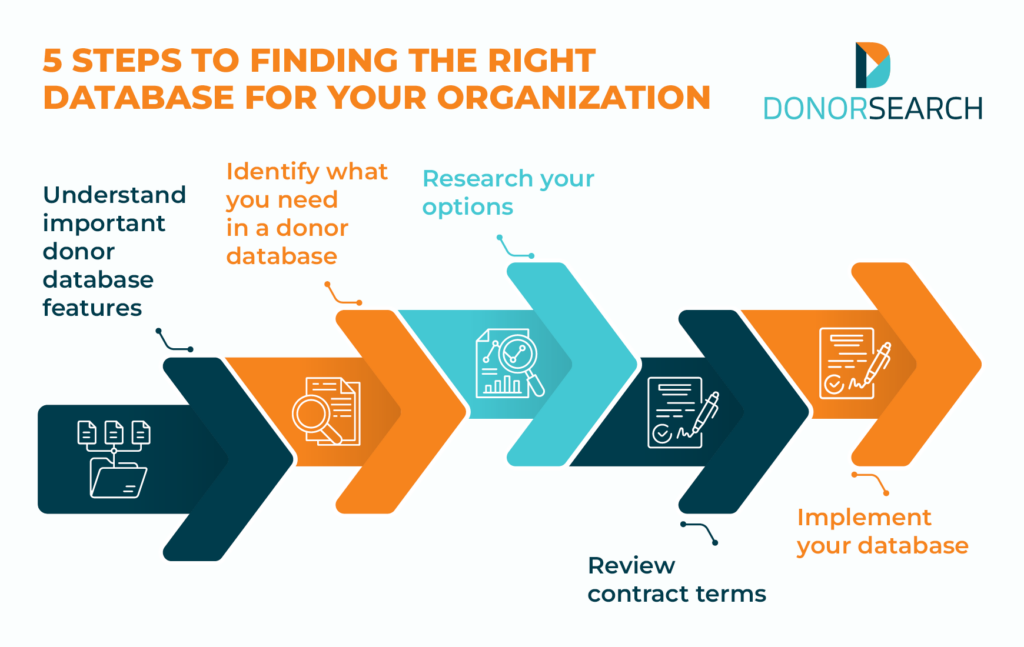
1. Understand important donor database features.
First, your team should familiarize itself with what donor databases can do for your organization. Some of the most important features to consider are:
- Donor profiles
- Communication segmentation
- Scalability
- Customization options
- Integrations
- Data security measures
- Availability of support and training resources
Implementing a new donor database can fundamentally alter how your nonprofit functions, so knowing these capabilities at the outset can help you understand the scope of how you’ll use the software and inform your buying decisions.
2. Identify what you need in a donor database.
While every donor database serves a similar purpose of storing information, they all have different features, price points, and learning curves. When gauging the must-haves for your donor database, answer the following key questions:
- What can we do to improve our data management practices?
- What’s our donor database budget?
- How many user profiles will we need?
- Do we need to integrate with other tools?
- What information fields are the most important for us to collect?
- How much time do we have for training?
The answers to these questions give you a solid foundation for picking the right donor database.
3. Research your options.
Using the insights you gained from the previous stage, you can start researching the different donor database options available and pick your front runners. Follow these tips to ensure an efficient research stage:
- Consult nonprofit peers for suggestions.
- Read online reviews from other users.
- Attend software webinars and conferences.
- Book one-on-one software demos or free trials with product experts.
- Look up the software’s integrations with fundraising tools, especially prospect research tools like DonorSearch.
Once you have a list of your top contenders, compare their advantages and drawbacks until you find a winning solution for your nonprofit.
4. Review contract terms.
Before you sign on the dotted line, ensure you thoroughly review your contract with the software provider and keep an eye out for:
- Hidden fees
- Payment schedule
- Data security and ownership provisions
- Contract duration and renewal conditions
If you haven’t already looped them in, remember to consult with important decision-makers at your nonprofit during this stage, such as your board and president, so everyone’s on the same page about the new addition to your tech stack.
5. Implement your database.
No matter the scale or features of your database, you’ll have to budget ample team time to implement your database. However, these steps can simplify and expedite the implementation process:
- Involve professionals. Whether it’s a product expert from the database provider itself or a tech consultant who specializes in nonprofit software, training your team with professional help eliminates confusion and elevates confidence.
- Leverage free educational resources. Use highly-rated resources and tutorials on websites like YouTube for a low-cost, convenient training experience.
- Proactively manage your training schedule. Fully integrating your donor database into your nonprofit is a significant undertaking for your already busy team. To make it more manageable, intentionally stagger your training exercises so they don’t interfere with other responsibilities. Presenting different elements of your database in chunks will also help your team internalize its features and capabilities more easily.
Throughout this process, be patient—taking the time to ensure that your team members are fully comfortable with the software will prevent issues down the line.
Using Your Donor Database for Fundraising: 5 Tips
Your donor database provides the infrastructure for a data-driven fundraising strategy. However, to make your data work for you, you need to keep these essential best practices in mind:
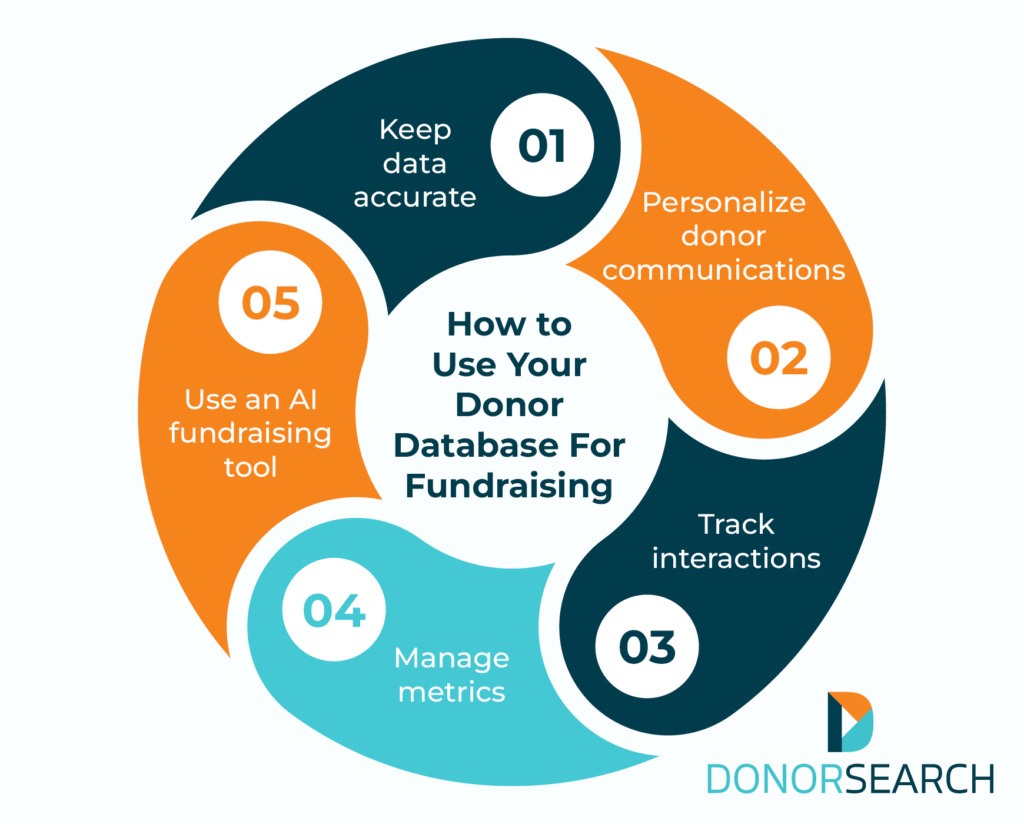
- Keep your data accurate and up to date. Your database is only as good as the quality of your data. With information constantly flowing in and out of your system, you need to continually update your donor profiles. DonorSearch’s data appending services can help you find missing donor information to supplement their profiles.
- Personalize donor communications. The most important trait of effective donor communication is personalization. Use your donor database to segment your communications and provide information about your previous conversations with donors.
- Track interactions and involvement. As you communicate with donors, consistently log information about your interactions in individual profiles, such as wealth capacity and philanthropic behavior. Set a standard schedule for entering interactions so nothing slips through the cracks.
- Manage metrics and set goals. Don’t set your campaign goal and forget it! Consistently pull metrics from your donor database so you understand where you stand and can pivot your approach if needed.
- Use an AI fundraising tool. AI can streamline crucial fundraising processes such as prospect research, segmentation, and strategic planning by using predictive analysis models. Plus, there are AI tools like DonorSearch Ai that are custom-built for nonprofit fundraising. Just ensure that you do right by your donors by using your AI tool responsibly.

All of these strategies will help you make your donor research and relationship cultivation more accurate and effective. Now that you know these essential tips, let’s review the best options on the market.
19 Donor Database Providers to Choose From
- Bloomerang
- DonorPerfect
- Virtuous
- Microsoft Dynamics 365
- Salesforce for Nonprofits
- Little Green Light
- Raiser’s Edge NXT
- Blackbaud CRM
- Andar/360
- DonorSnap
- Eleo
- Giveffect
- Humanitru
- Keela
- MISSION CRM
- Bonterra
- ResultsPlus
- Givebutter
- Ellucian
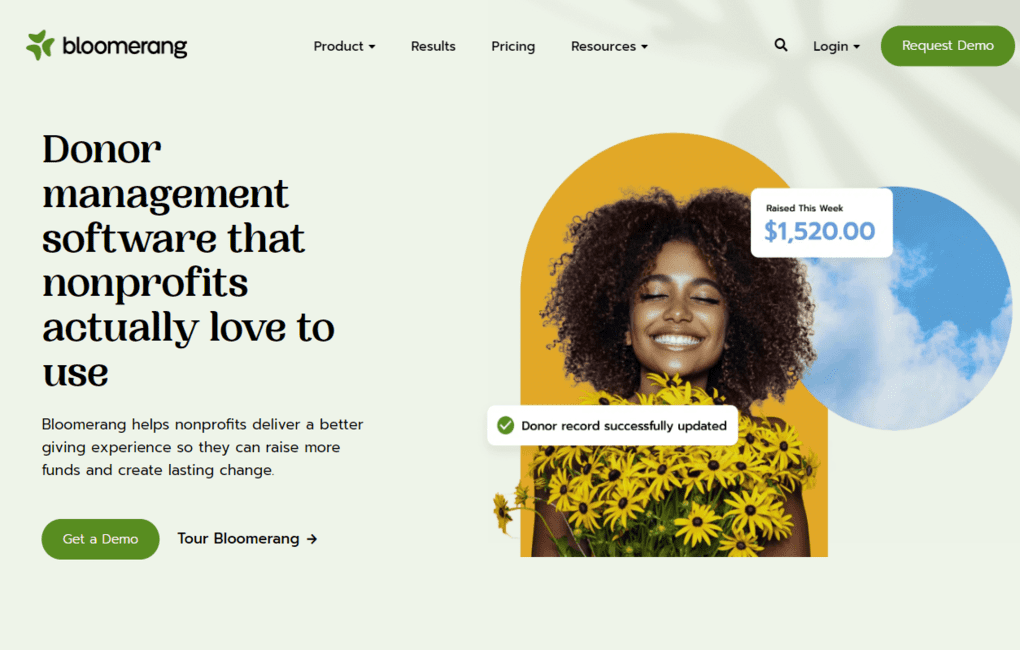
1. Bloomerang
Bloomerang is a comprehensive donor data management solution for nonprofits of any size or experience. Its donor database has the following features:
- Integrations: Connect Bloomerang with your other tools to avoid information silos.
- Interactive dashboard: Monitor your donation trends, retention rates, and more to bolster your productivity.
- Wealth screening metrics: See your donors’ potential to give more with Bloomerang’s custom Generosity Score metric.
- Data segmentation: Use robust filters to find the donor information you need easily.
Pricing
Bloomerang has a sliding price scale depending on how many records your nonprofit needs to store. Plus, it has an exclusive price bracket for nonprofits that raise less than $250,000 per year. Visit Bloomerang’s website to request a live demo with a product expert.
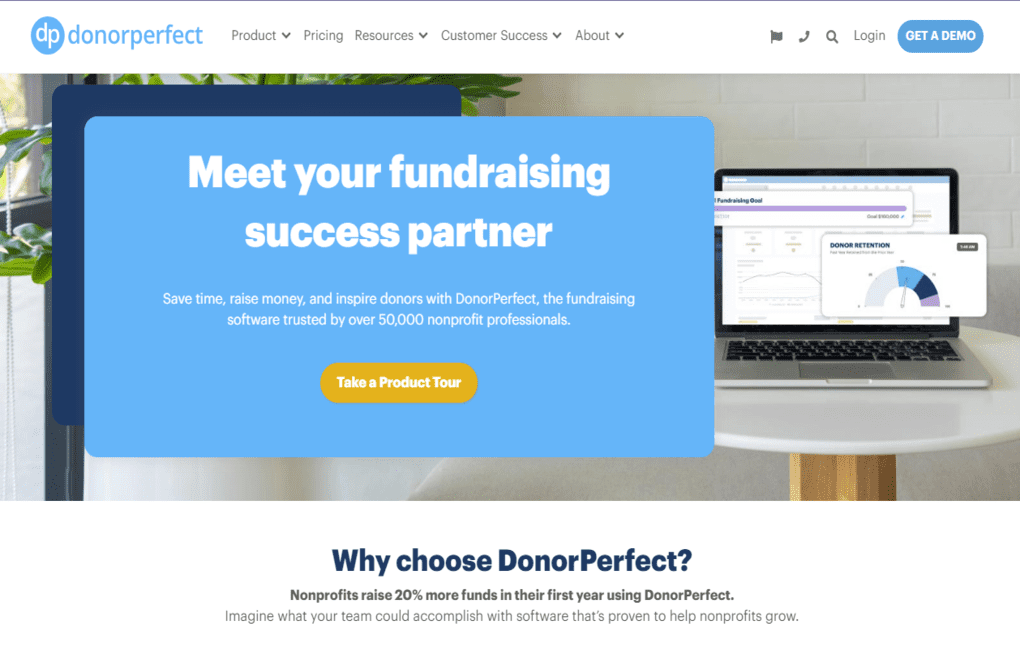
2. DonorPerfect
DonorPerfect is a customizable database for nonprofits of any size with the following notable capabilities:
- Advanced batch entry: Enter gifts and pledges in large batches to streamline your data entry process and improve accuracy.
- Customizable interface: Change your database layout screen to feature only the most important information for your nonprofit.
- Role assignment: Assign roles and permissions to your users so that only the team members who need to see certain datasets have access.
Pricing
DonorPerfect has a variety of price points depending on how extensive your dataset needs to be and starts at $99 per month. Visit their website to learn more and book a free demo.
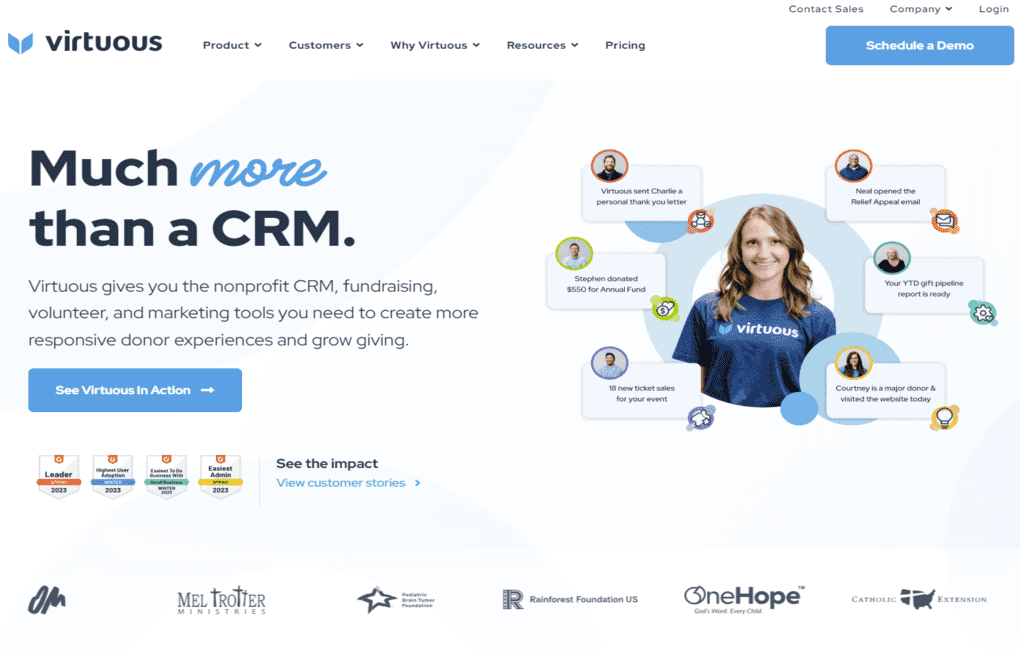
3. Virtuous
Virtuous is a CRM that allows nonprofits to optimize all of their activities, from donor data tracking to marketing to event registration. Some notable features include:
- Donor journey builder: Contextualize all of your data for a certain donor to map out their journey and plan the next steps.
- Specific features based on nonprofit type: Virtuous has success stories for all different types of nonprofits, including human service organizations, higher education institutions, and ministries.
- Workflow automation: Assign tasks to users and automate workflows for email marketing, donation follow-up outreach, and more.
Pricing
Virtuous has three pricing tiers based on the number of contacts you need to store: Starter, Platform, and Enterprise. Connect with Virtuous’ team on their website to schedule a demo today.
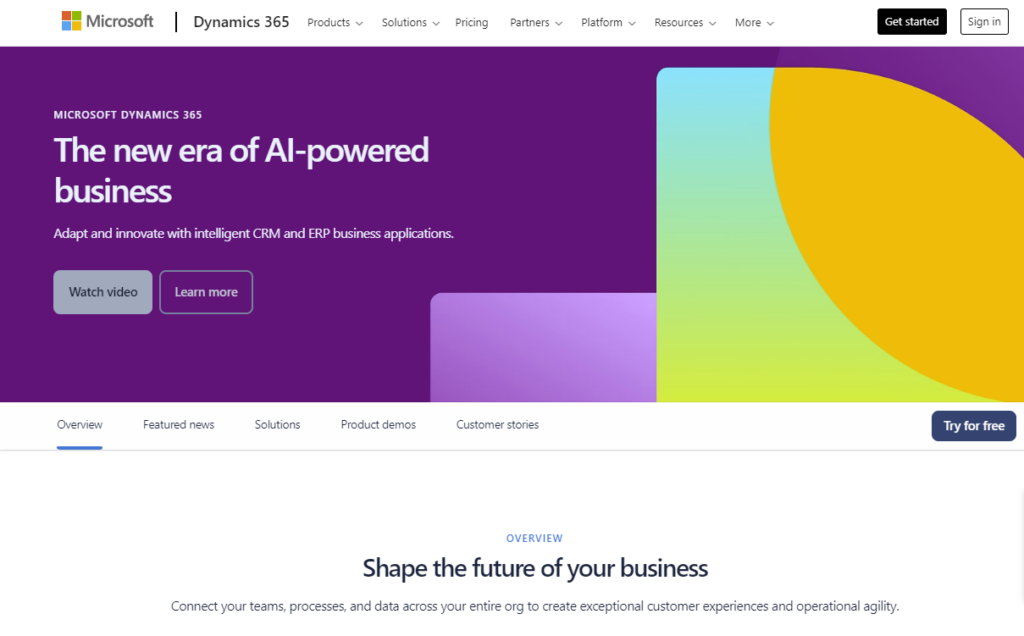
4. Microsoft Dynamics 365
Microsoft Dynamics 365 is a CRM that integrates with the Microsoft Suite and is well-suited for large organizations. Some key features include:
- AI-powered workflows: Microsoft Sales Copilot helps development professionals streamline their donor acquisition cadences with razor-focused strategy recommendations.
- Financial management: Simplify accounting, budgeting, and more with Dynamics 365 Finance and Business Central.
- Data modeling: Dynamics 365’s Common Data Model leverages data schemas to give you a complete picture of your activities.
Pricing
Microsoft offers a Business Premium grant to eligible nonprofits that allows them to pay only $5.50 per month for 10 seats on Dynamics 365. Learn more and book a free trial on the Microsoft website.
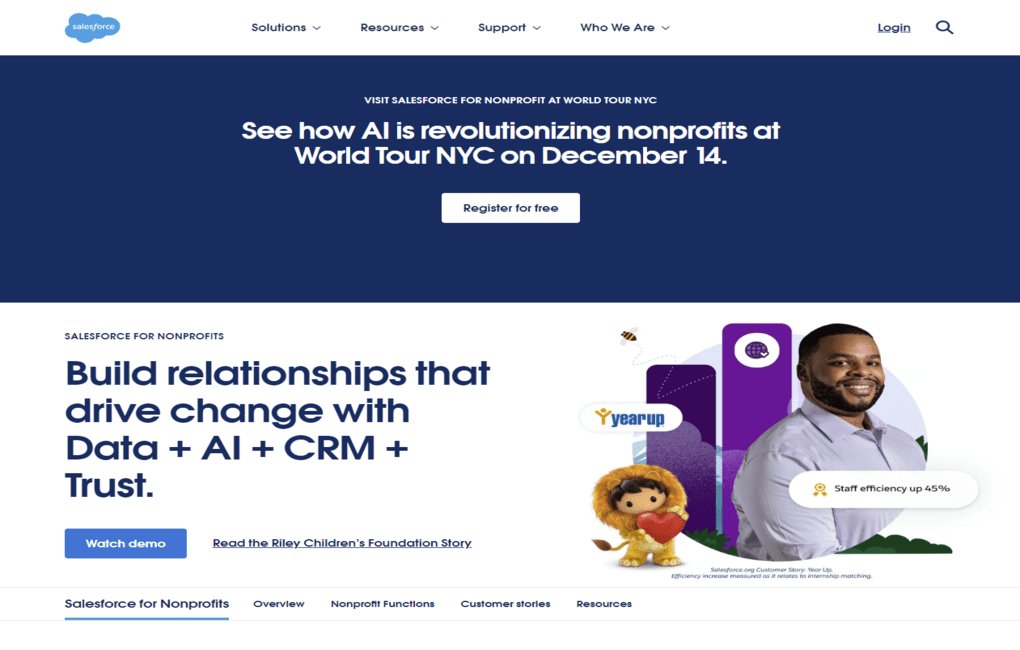
5. Salesforce for Nonprofits
Salesforce for Nonprofits is a nonprofit management system with these features:
- Program data management: Instantly track how your programs are performing so you can make adjustments.
- Marketing automation: Configure automated cadences that trigger when certain conditions are met for instant communication.
- Reporting: Gather a wide range of information and view it holistically with customizable reports.
Pricing
Salesforce’s Nonprofit Cloud starts at $60 per month for eligible nonprofits. Learn more on their website.
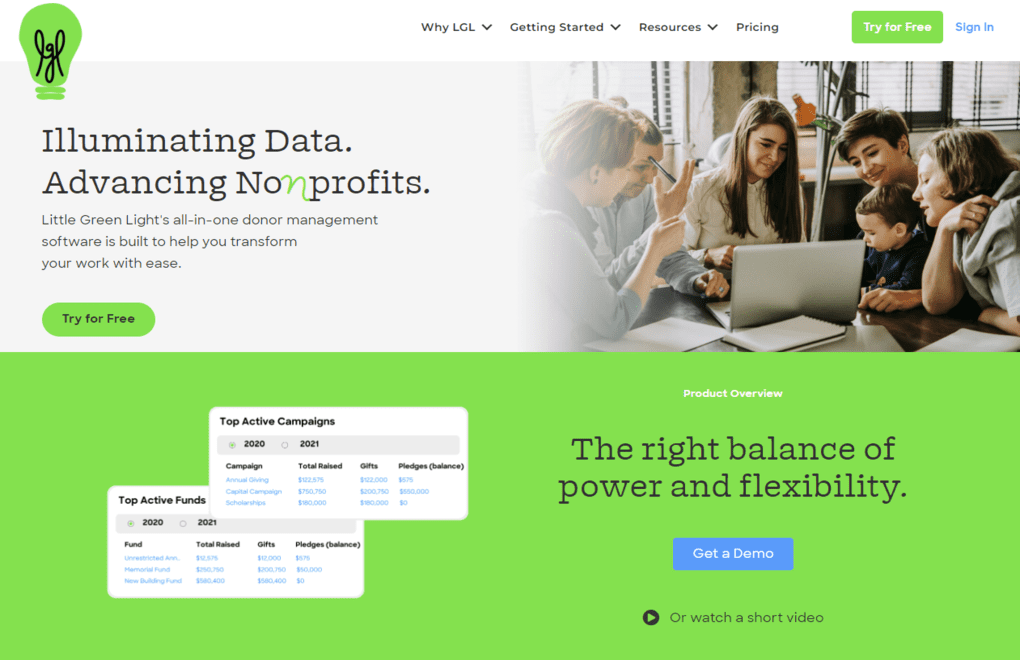
6. Little Green Light
Little Green Light is a donor management software with features like:
- Automated acknowledgment and receipts: Quickly produce acknowledgments and receipts for your donors.
- Import and export data: Migrate data easily with Little Green Light’s native import tool.
- Servers hosted by Lightcrest: Feel secure in your data management with Little Green Light’s servers, which are hosted by Lightcrest.
Pricing
Little Green Light uses a sliding pricing scale based on how many donor records you need. Their plans start at $45 per month. Try the solution for free on their website.
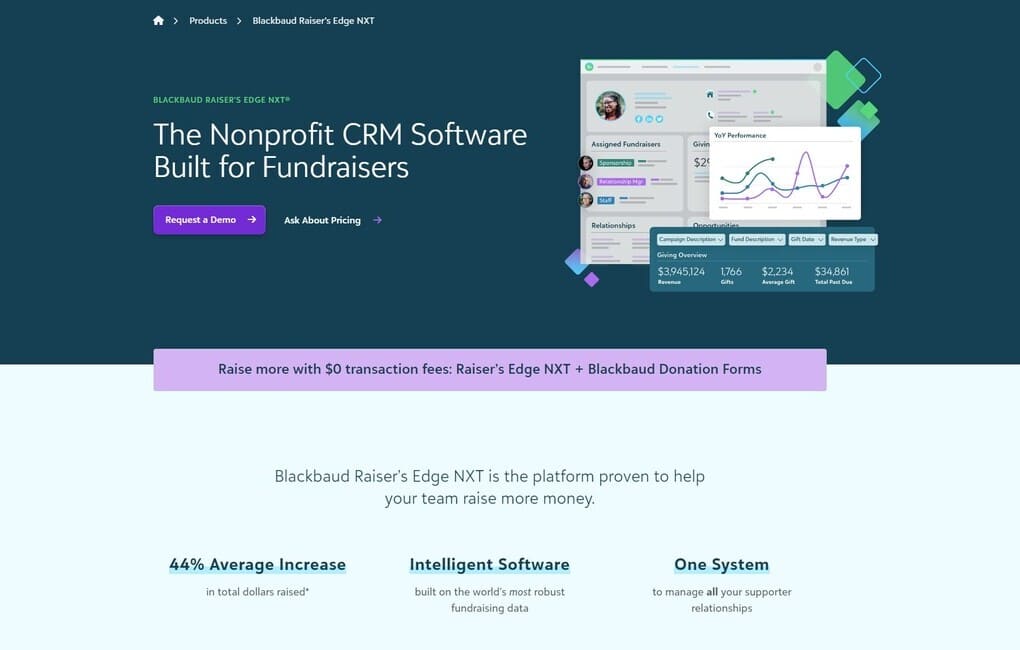
7. Raiser’s Edge NXT
Raiser’s Edge NXT is a donor database made for larger nonprofits, with features such as:
- End-to-end gift management: From gift entry to online donation forms, maintain control of your donor data at all stages.
- Custom analytics: Target niche audiences with granular segmentation analytics.
- Best-practice templates for email: Use proven techniques to enhance your email outreach.
Pricing
Raiser’s Edge NXT pricing is custom to each organization that requests a quote. Reach out to their team today using their website.
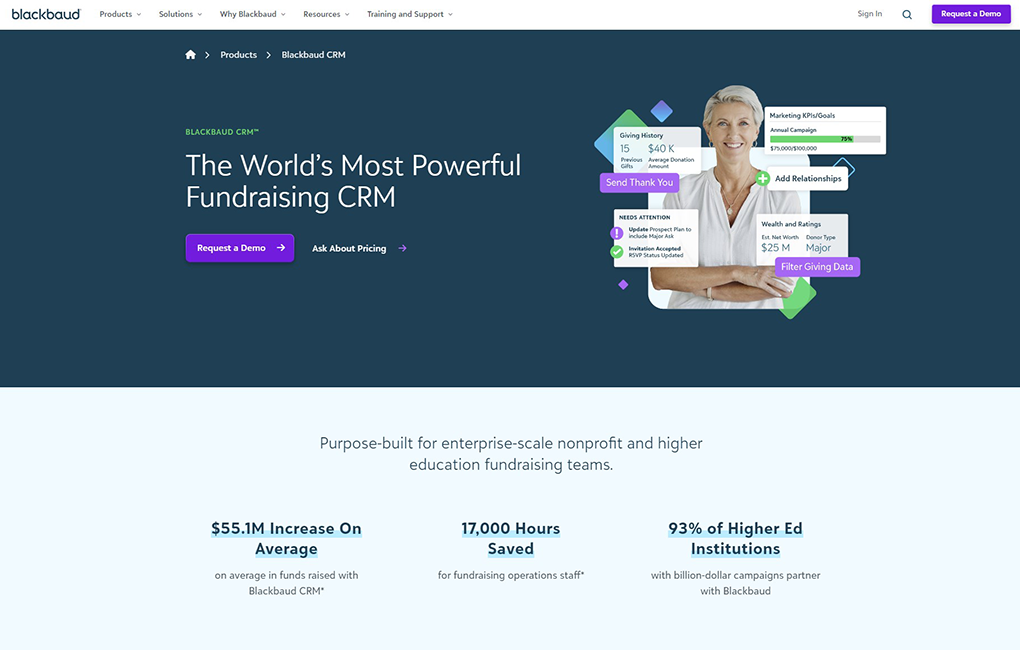
8. Blackbaud CRM
Blackbaud CRM is a highly customizable donor database made for larger nonprofits. Some notable features include:
- Constituent relationship management: Track and cultivate donor relationships with Blackbaud’s powerful CRM features.
- Multichannel fundraising: Manage campaigns from direct mail campaigns to peer-to-peer fundraising with integrated fundraising tools.
- Financial reporting: Leverage comprehensive reporting and analytics features to instantly gauge your financial performance and understand trends.
Pricing
Contact Blackbaud CRM for a custom quote and to book a demo.
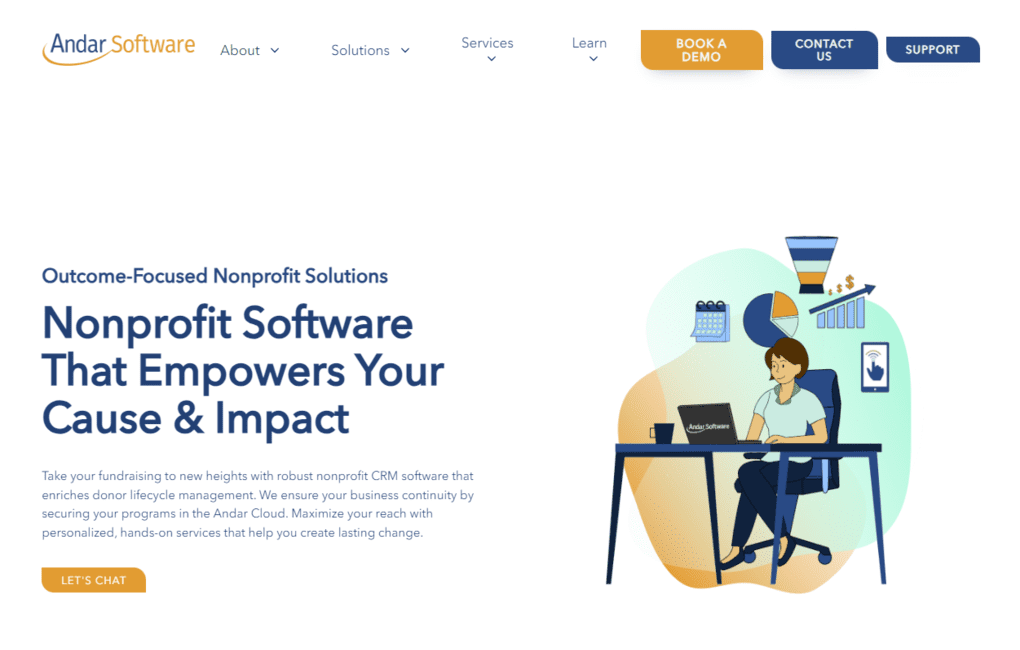
9. Andar/360
Andar/360 is a donor database that specializes in workplace fundraising. Some features of note are:
- Targeted text messaging: Instantly reach donors and volunteers wherever they are using Andar Texting.
- Grants management: Keep track of your grants in progress and allocate funds when you win them.
- Multi-device functionality: Access your donor data on supported devices, such as smartphones and tablets.
Pricing
Contact Andar Software for detailed pricing information and to book a demo.
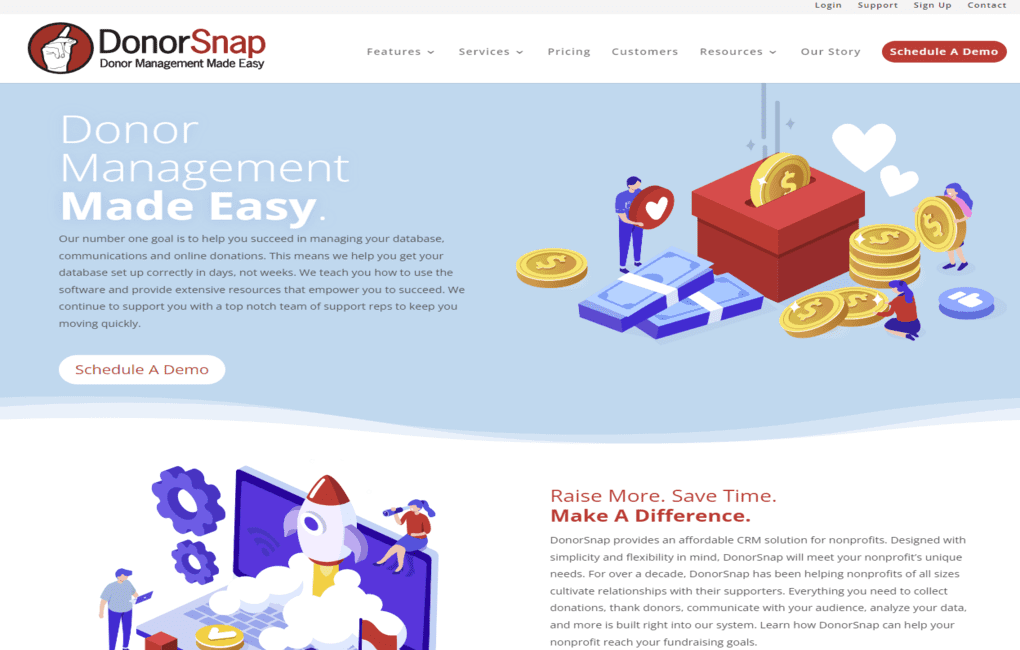
10. DonorSnap
DonorSnap is a donor data and marketing management platform, with key features like:
- Event management: Track event registrations, ticket sales, and volunteer hours in real time with DonorSnap’s app.
- Reporting tools: View your data in the best way for your organization with custom dashboards.
- Support and training: Get onboarded to DonorSnap and get your questions answered at any time by product experts.
Pricing
DonorSnap has a sliding pricing scale based on how many records your nonprofit needs, starting at $39 per month. Visit their website to schedule a live demo.
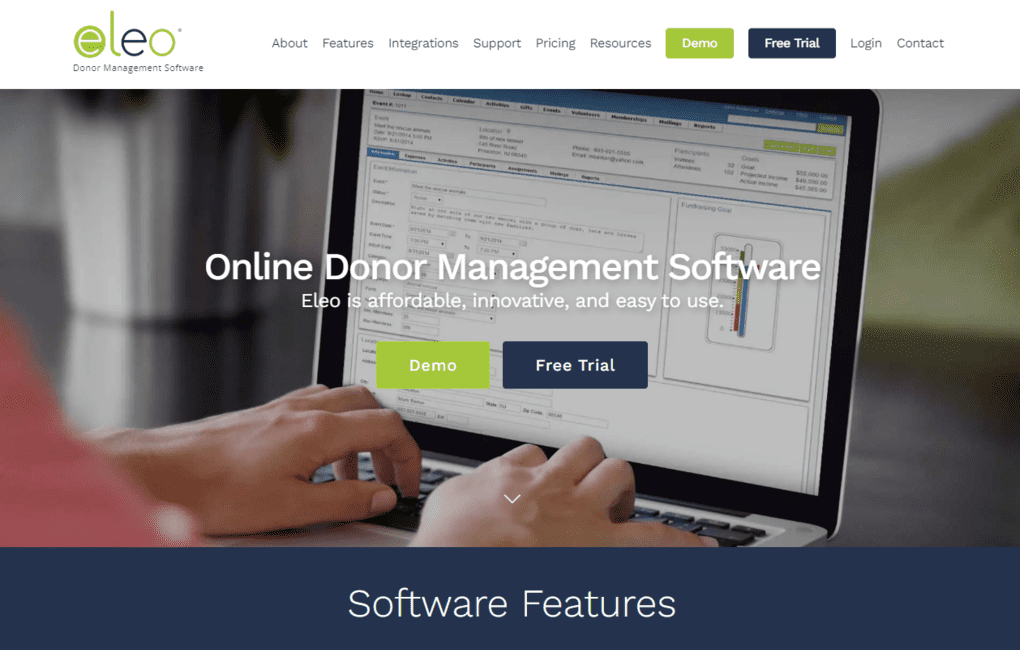
11. Eleo
Eleo is an online donor management software with the following capabilities:
- Donation page management: Improve your donation page with Eleo’s user-friendly form creation interface.
- Volunteer management: Develop your volunteer records with fields like skills, hours, and availability.
- Data security and backup: Protect your data with firewalls, antivirus protection, and SSL and encryption.
Pricing
Eleo has a sliding price model depending on how many donor records you need and starts at $39 per month. Learn more with a riskless free trial.
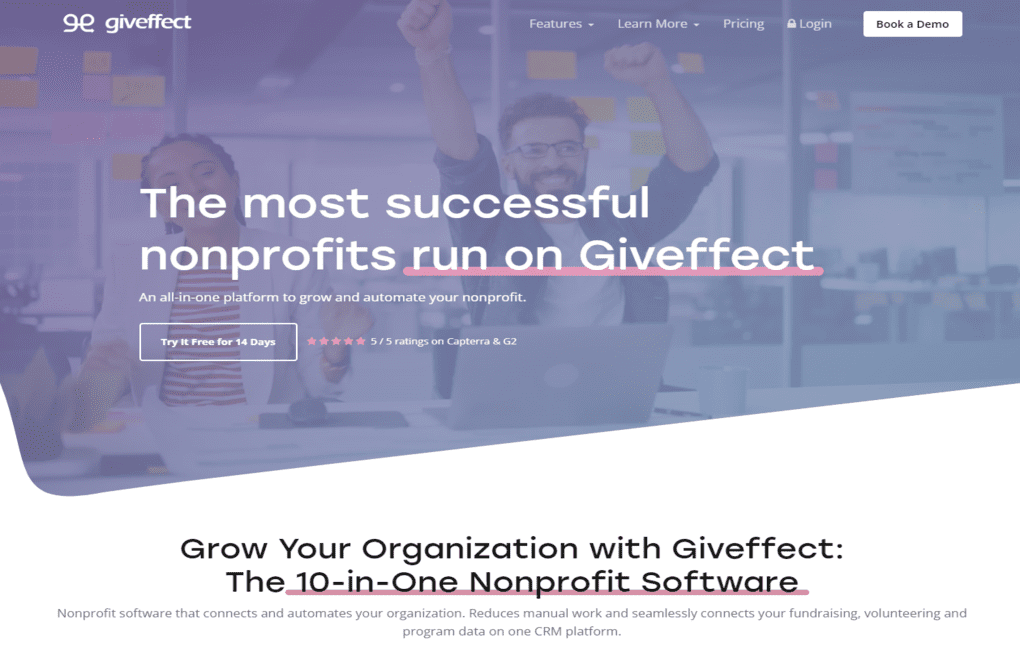
12. Giveffect
Giveffect is a comprehensive nonprofit management software solution with features like:
- Peer-to-peer fundraising management: Manage your supporters’ fundraising pages for peer-to-peer campaigns.
- Team fundraiser management: Get custom support for team-based events like run-a-thons and workplace giving events.
- Membership stratification: Categorize your membership data by level and benefits so you can pinpoint your most popular tiers.
Pricing
Giveffect’s pricing depends on the size of your nonprofit, with the smallest plan starting at $399 per month. They also offer a discount if you only need fundraising tools instead of the entire plan. Explore more features by booking a demo on the Giveffect website.
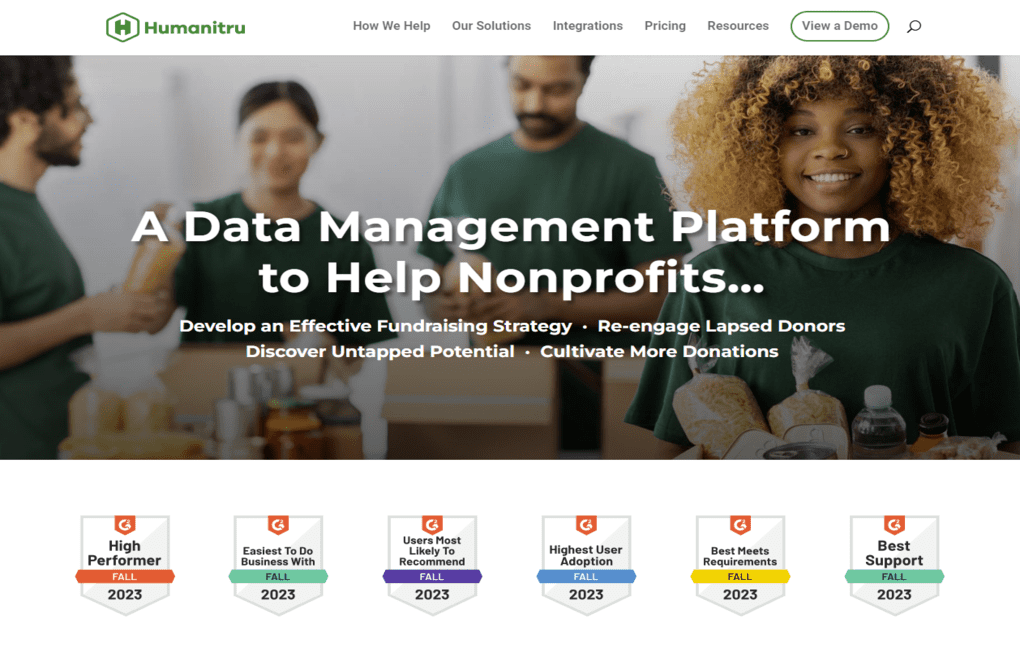
13. Humanitru
Humanitru is a data management platform for nonprofits with these capabilities:
- Self-service donor portals: Empower donors to take control of their finances with self-service payment portals.
- Mobile bidding: Make your charity auction a breeze for donors with a streamlined mobile bidding experience.
- Text-to-give: Allow donors to give anywhere, anytime with an intuitive text-to-give infrastructure.
Pricing
Humanitru pricing depends on the size of your nonprofit. Contact Humanitru for a complete pricing rundown.
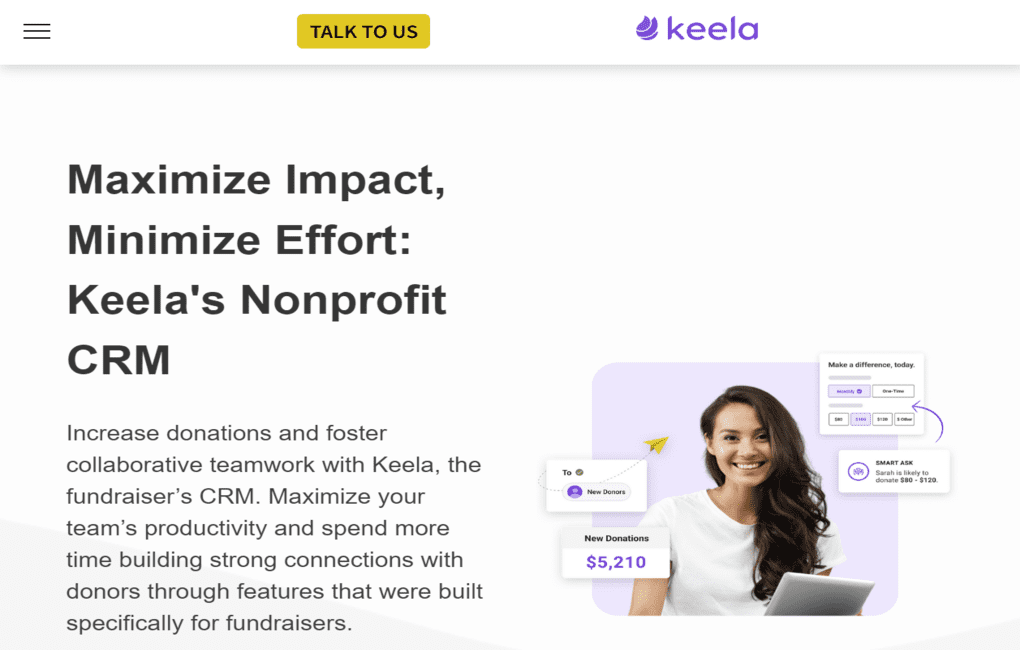
14. Keela
Keela is a CRM that stands out with these capabilities:
- Project management: Keep your team on track with automated workflow management.
- Donor pipeline management: Manage your donor journeys with granular precision with Keela’s pipeline functionality.
- Smart Ask for donations: Keela’s Smart Ask program uses your data to pinpoint the ideal ask amounts for donors.
Pricing
Keela has an add-on pricing structure, meaning you only pay for what you need. All plans start at $134/month. Reach out to them to book a demo.
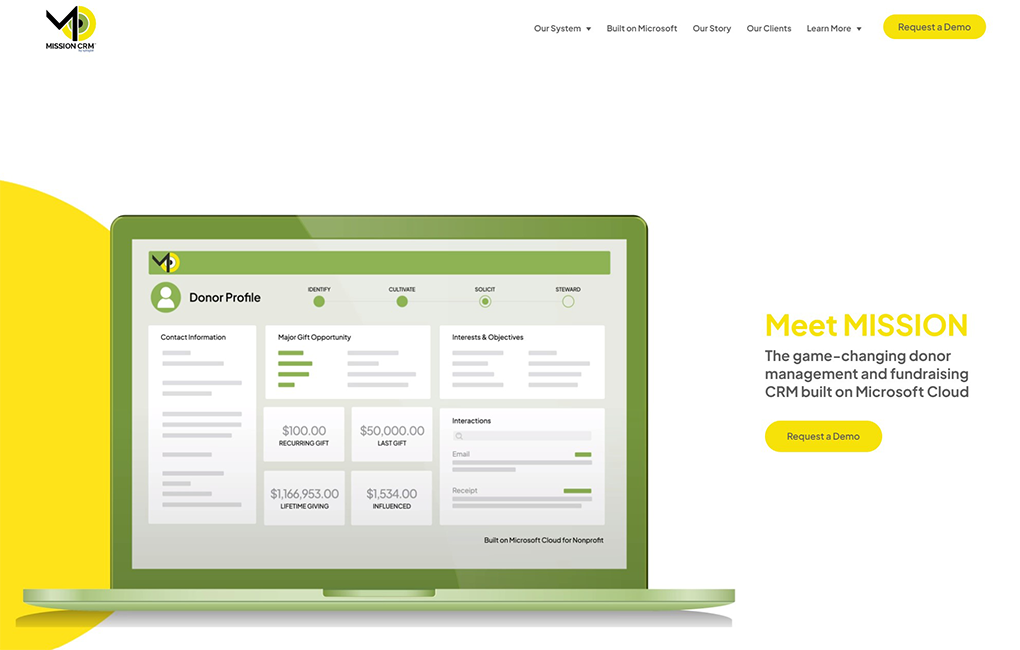
15. MISSION CRM
MISSION CRM is a unified CRM built for nuanced financial operations that offers the following features:
- Built on Microsoft Cloud: Leverage everything from AI workflows to fundraising management to comprehensive donor profiles with tools powered by Microsoft.
- Integrated online fundraising and event management: Take your fundraising event management online for an effortless, integrated experience.
- Common Data Model: Eliminate data silos easily and operate within a centralized hub of important donor information.
Pricing
MISSION CRM has an annual license, and each organization gets a custom price. Contact them to request a demo and pricing.
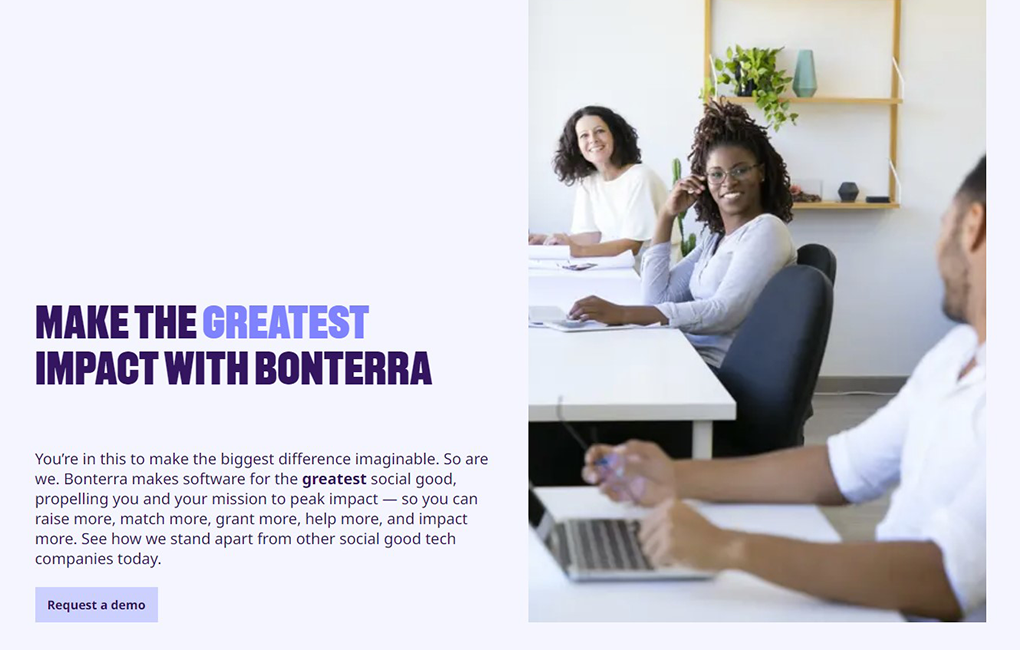
16. Bonterra
Bonterra is a donor database that covers multiple areas of data management. Some notable capabilities include:
- Unified data: Save data from fundraising, digital, and organizing solutions in one centralized location.
- Automated tasks: Streamline mundane tasks to achieve more in a day’s work.
- Recording customization: Access the information you need instantly with highly customizable data fields and filters.
Pricing
Bonterra’s pricing varies based on organizational needs. Contact them to request a demo and pricing.
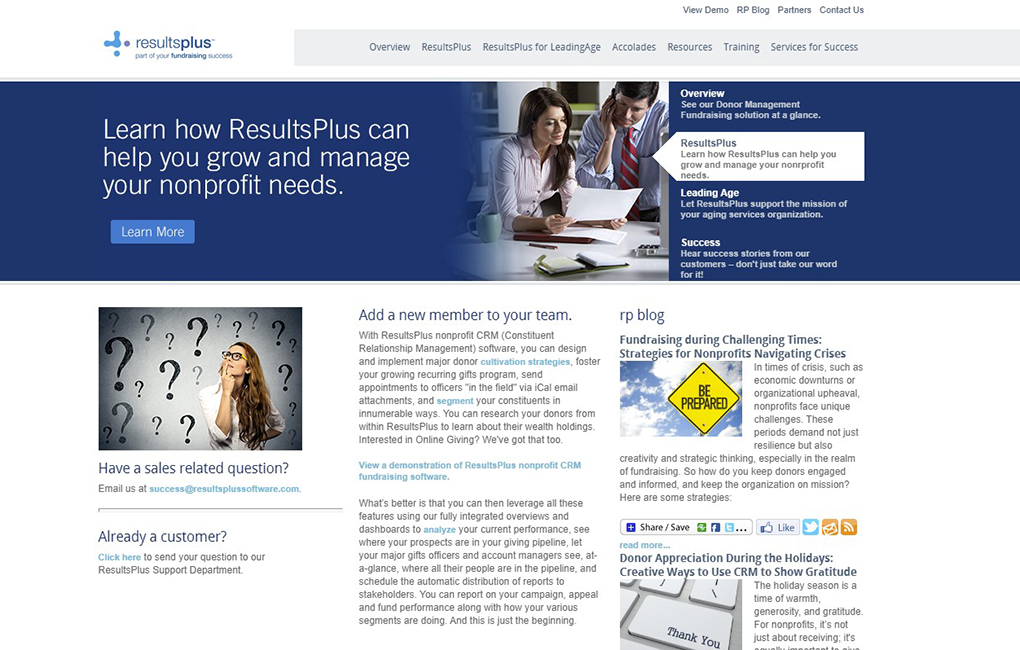
17. ResultsPlus
ResultsPlus is a CRM that has features like:
- Gift processing: Process, record, and attribute gift information in a secure database.
- Event planning: Execute your events with precision with guest list and registration management, seating arrangement, and post-event analytics.
- Training resources: Boost your return on investment and reduce confusion with comprehensive training and support resources.
Pricing
Contact the ResultsPlus team to request a detailed price breakdown and demo.
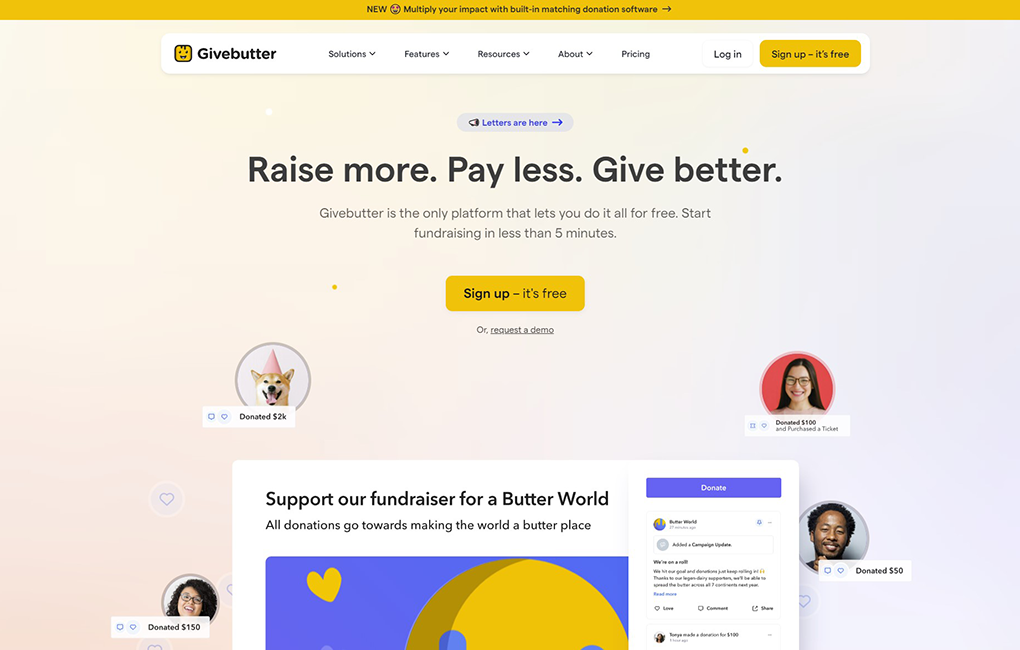
18. Givebutter
Givebutter is a donor database and fundraising platform that offers:
- Auction management: Add unlimited items, leverage mobile bidding, fulfill winning bids, and collect payment easily.
- Donor segmentation: Organize, export, and present donor information with features like custom filters and table creation.
- Data hygiene: Keep your email, phone, and mailing address data squeaky clean with data validation and duplicate records removal.
Pricing
Givebutter is powered by optional tips, making it completely free to sign up and start fundraising.
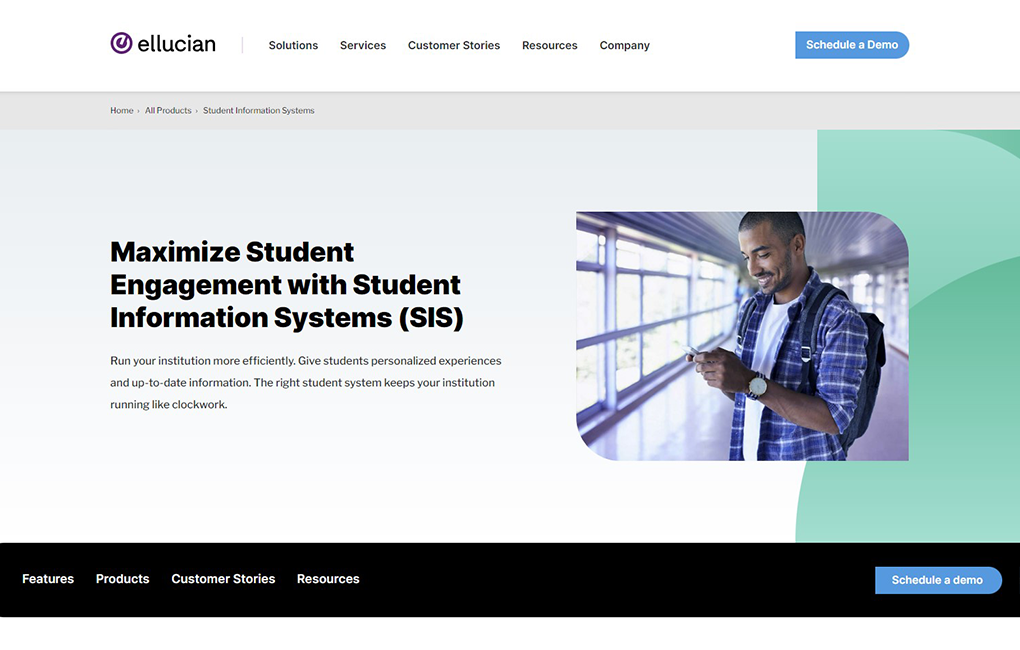
19. Ellucian
Ellucian is a CRM made for higher education institutions. It offers features like:
- CRMs made for unique needs: Between CRM Advance, CRM Advise, and CRM Recruit, higher education institutions can manage donor relationships, recruitment data, and academic advising.
- Pipeline management: Ensure your donors or prospects remain engaged through the donation process.
- Donor appreciation: Express your gratitude to contributors by automatically sending a thank-you note when they give.
Pricing
Reach out to Ellucian for in-depth pricing information and to book a demo.
Final Thoughts
Whether you’re sourcing smaller recurring donations or major gifts, donor relationship cultivation is one of your primary responsibilities, so using the most powerful tools available to streamline your processes is important. By investing the time and resources into implementing the best donor database for your organization, you can achieve fundraising success both now and in the future.
- Fundraising Intelligence: Using AI To Enhance Philanthropy. Learn more about how AI can power up your nonprofit’s approach to fundraising with this guide.
- Grateful Patient Programs: 3 FAQs & How to Get Started. Healthcare organizations can secure further financial support from loyal patients by launching a grateful patient program. This beginner’s guide can help you launch a successful program.
- University Fundraising: 5 Flawless Tips to Engage Alumni. After graduation, it’s up to your school to keep your relationships with alumni strong. Learn how to engage alumni for fundraising success in this guide.

